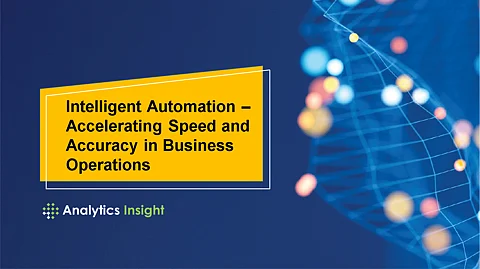
- Insights
- Cryptocurrencies
- Stocks
- White Papers
- Industry
- Geography
- Insights
- Cryptocurrencies
- Stocks
- White Papers
- Industry
- Geography


Companies today are already practicing the abilities behind automation and artificial intelligence as these technologies assist in addressing a range of societal difficulties from healthcare to manufacturing and environmental change.
Meanwhile, these new-age technologies can transform the idea of work and the working environment itself. AI, machine learning and automation have the ability to complete a variety of tasks more accurately in large numbers compared to humans, and also supplement the work they do.
Automation is now at the forefront of digital transformation for enterprises across the world. The convergence of AI and automation leads to "Intelligent Automation". When compared with 'normal' scripted or rules-based automation, intelligent automation can be connected to progressively intricate processes; empowering more remarkable pace and precision; and is equipped for eliminating data and determining learnings that can be fed into downstream procedures.
Intelligent automation systems sense and synthesize massive amount of information and can automate entire procedures or workflows. Applications range from the routine to the revolutionary – from gleaning, assessing, and making decisions about textual information to guiding self-driving vehicles and advanced robots. The technology is already helping companies to exceed conventional performance trade-offs to accomplish unprecedented levels of efficiency and quality.
Artificial intelligence and automation are hardly new for some businesses, and the technologies have progressed considerably in recent years. Developments in machine learning, improvements in sensors, and ever-greater computing power have assisted in creating a new generation of hardware and software robots with practical applications in almost every industry. As a result, this progress has lured the interest of venture investors, technology firms, and a growing number of clients that are deploying intelligent automation in both physical and information systems.
Some intelligent automation technologies, including those powering a new generation of collaborative robots and Google's autonomous cars, evaluate and respond to a stream of situational data from sensors. IBM's Watson uses intelligent automation to ingest and analyze huge amounts of textual insights to retort quickly to multifaceted inquiries, such as a request for a medical treatment plan.
Intelligent automation advancements are developing at a rapid pace helping companies achieve key business outcomes and advance their business processes. It is now being leveraged to streamline business workflows and make complex decisions faster.
The range of business issues where intelligent automation can be implemented is expanding in areas including voice recognition, natural language processing (NLP), and machine learning (ML) to improve and become hands-on for non-specialists. These technologies are gradually accessible in open source or low-cost products or cloud-based services.
The advances in AI and RPA (Robotic Process Automation) are developing a favorable environment and enabling companies to grasp the concept behind intelligent automation. It is also allowing businesses to leverage combined efforts of AI, robotics and human capabilities.
Looking at the current trends, researchers predict that the global market of AI will reach US$26.4 billion by 2023, at a CAGR of 40%. This is largely attributable to businesses investing more in intelligent automation technologies to create an intelligent working environment to advance operational performance and customer experience.
A recent KPMG study, which surveyed among 600+ business leaders across 13 countries, found that more than 50 percent of participants had already invested over US$10 million in intelligent automation projects.
Some companies are investing in intelligent automation to sustain into mature product categories, including automobiles. Additionally, businesses are implementing this technology to foster efficiency, enhance quality, lessen labor costs, and reassign workers from low- to higher-value tasks.
In brief, effective implementation of intelligent automation technologies supported by substantial capital investments can transform today's business the companies perform. The technology is likely to become an indispensable driver of organizational performance shortly. It is also significant for companies across all industries to comprehend and adopt intelligent automation or risk falling behind.
